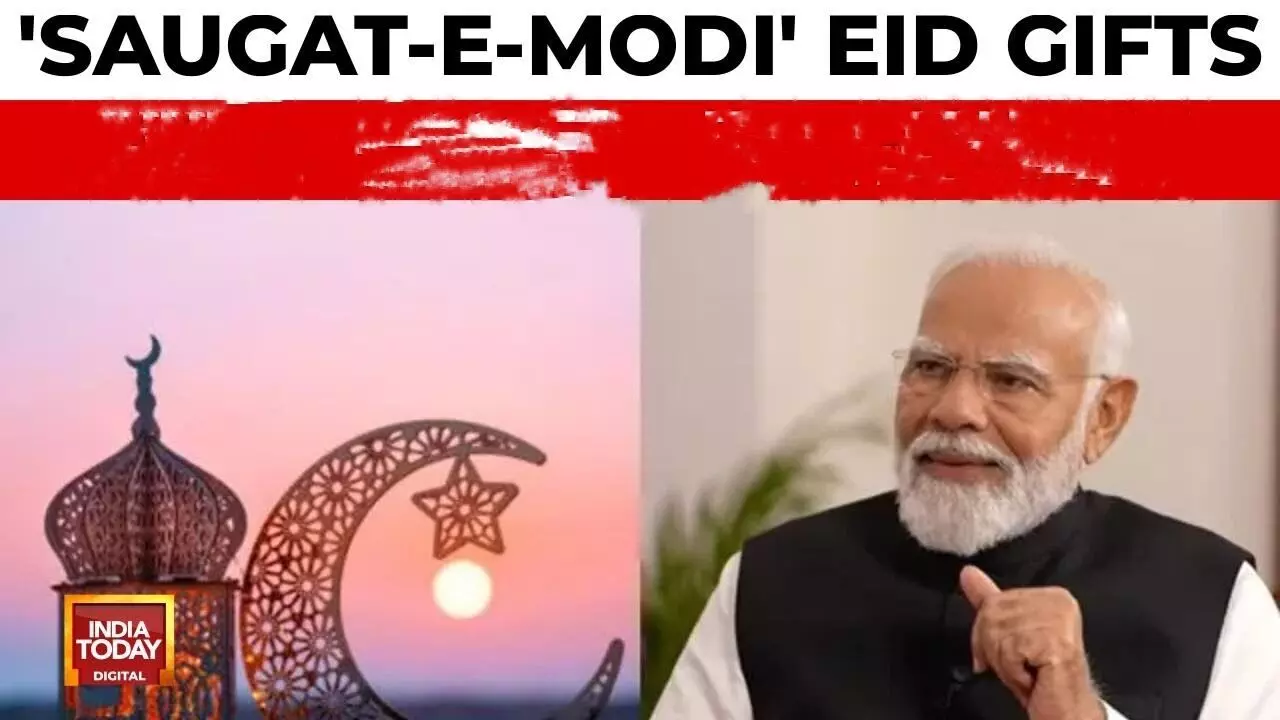Saugat-e-Modi: A Strategic Outreach or Political Posturing?

The Bharatiya Janata Party (BJP) has initiated the "Saugat-e-Modi" program, a strategic move aimed at engaging with the Muslim minority. While this initiative appears to signal inclusivity, its relevance must be examined in the broader ideological context of the BJP and the Rashtriya Swayamsevak Sangh (RSS). This outreach comes against the backdrop of deep-rooted communal narratives, historical policy decisions, and an evolving electoral strategy that has defined Prime Minister Narendra Modi's leadership.
Narendra Modi's political trajectory has been shaped by his firm ideological positioning. One of the most telling moments in this regard was his 2011 refusal to wear a Muslim skullcap during a Sadbhavna fast in Gujarat. This act symbolized his rejection of symbolic appeasement politics, reinforcing his image as a leader committed to Hindutva. While this stance consolidated Hindu voter support, it also deepened Muslim apprehensions about the BJP’s intentions. However, Modi's narrative evolved over time, seeking to balance Hindutva credentials with an image of governance and development.
The 2014 general elections saw the BJP win 282 seats, marking a historic shift in Indian politics. Modi’s leadership was projected as a break from traditional caste-based and minority-focused vote bank politics. However, despite development rhetoric, the BJP remained tied to its Hindutva agenda. The construction of the Ram Mandir, legal disputes around the Krishna Janmabhoomi and Gyanvapi mosque, and narratives such as ‘Love Jihad’ continued to shape public discourse. Uttar Pradesh Chief Minister Yogi Adityanath, in a speech in February 2024, remarked, "Now our Krishna Kanhaiya is adamant," hinting at the BJP’s focus on Mathura after Ayodhya’s Ram Mandir.
While Modi has attempted to position himself as a statesman on the global stage, religious polarization within India poses challenges to this ambition. His efforts to mediate in international conflicts, such as his engagement in Russia-Ukraine peace talks, risk being undermined by communal discord at home.
The BJP’s internal contradictions further complicate this image. RSS Chief Mohan Bhagwat has repeatedly called for religious harmony, stating in June 2022, "There is no need to look for a Shivling in every mosque and escalate disputes daily." However, this reconciliatory stance is often at odds with statements from BJP leaders who continue to push hardline narratives.
Mohan Bhagwat has reiterated that Hindu-Muslim unity is essential for India's progress, stating on February 17, 2025, "Hindus must unite, but unity does not mean enmity towards others. Our vision is Vasudhaiva Kutumbakam—one global family." This reflects the Sangh’s broader ideological messaging that emphasizes cultural nationalism but remains ambiguous on practical political inclusivity.
Dattatreya Hosabale, the RSS Sarkaryavah, echoed this sentiment on March 23, 2025, when he said, "The Sangh works to unify the nation. Social cohesion is our responsibility, and we must ensure everyone feels part of this land."
However, this messaging has not translated into action when it comes to political rhetoric and governance. The BJP governments in various states continue to push hardline policies, with leaders such as Yogi Adityanath, Mohan Yadav, and Pushkar Singh Dhami taking aggressive stances on religious issues.
The recent excavation at Sambhal’s Shahi Masjid and Yogi’s declaration that a temple will be built there further fuels religious tensions. These actions contradict Bhagwat’s calls for moderation and suggest that the BJP leadership operates on multiple ideological levels—one for governance and another for electoral mobilization.
The RSS has historically played a dual role—while its leadership preaches unity, organizations like the Vishwa Hindu Parishad (VHP) and Bajrang Dal continue to adopt aggressive postures. In March 2025, RSS General Secretary Dattatreya Hosabale asserted, "India is not just a piece of land; it is a philosophy of life, a spiritual treasure, and a Vishwaguru that enlightens the world." His emphasis on cultural nationalism indicates that while the RSS seeks a unifying message, its ideological core remains firmly rooted in Hindu identity politics.
BJP's recent outreach to the Muslim community, including meetings with clerics and attempts to address economic concerns, appears tactical rather than transformative. Indresh Kumar, a senior RSS leader, has been involved in such efforts through the Muslim Rashtriya Manch (MRM). In December 2021, he chaired a discussion on Muslim women's empowerment, projecting the RSS as an inclusive organization. However, electoral compulsions likely drive such moves more than genuine ideological shifts.
The challenge before Modi and the BJP is not just electoral arithmetic but the long-term implications of their communal strategy. If BJP genuinely seeks to engage with Muslims, it must move beyond symbolic gestures and address substantive issues like representation, economic upliftment, and social integration. Otherwise, initiatives like "Saugat-e-Modi" will be seen as mere political maneuvering rather than a sincere attempt at inclusivity.
As India moves towards another general election, the contradictions within the BJP’s ideological framework remain stark. While Modi projects himself as a global leader advocating peace, domestic religious tensions threaten to undermine this carefully curated image. The BJP's ability to navigate these contradictions will determine whether its outreach efforts are perceived as genuine or as another electoral gambit. In the end, Modi’s legacy—both at home and abroad—will be shaped by how effectively he reconciles his party’s ideological imperatives with the demands of governance and national unity.
